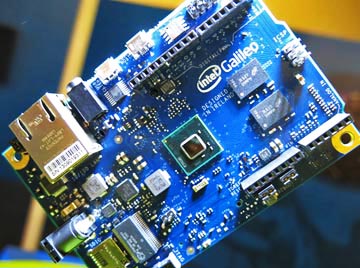Brian Krzanich, CEO of Intel, recently announced collaboration with Arduino LLC, and the new Galileo board, the first product in a new family of Arduino-compatible development boards with Intel architecture. The board targets artists, designers, and do-it-yourself enthusiasts who often don't have technical backgrounds and provides an easy programming method.
Krzanich also announced a donation of 50,000 Galileo boards to 1,000 universities worldwide over the next 18 months. “…..we know that hands-on learning inspires interest in science, technology, engineering and math,” said Krzanich. “I've been a 'maker' for many years and am passionate about the exciting possibilities of technology and what can be created with it” he said. Intel is working with 17 universities on six continents to develop curriculum based on the new Intel Galileo board.

The Galileo development board runs an open source Linux operating system with the Arduino software libraries, enabling scalability and re-use of existing software, called “sketches”. Intel Galileo can be programmed through Mac OS, Microsoft Windows, and Linux host operating software.
The board uses the Intel Quark SoC X1000, the first product from a new family of low-power, small-core devices. Quark technology will extend Intel architecture into the Internet of Things and wearable computing. Designed in Ireland, the Quark SoC X1000 is a 32-bit, single core, single-thread, Pentium instruction set architecture-compatible CPU, operating at up to 400 MHz. The IC has a single memory channel for up to 2 Gbytes of DDR3-800 with ECC, AMBA Bus fabric, 16 Kbyte cache, PCIe 2.0, three USB 2.0 and two LAN ports, and a maximum TDP of 2.2 W. It comes in a 15 x 15 mm package.
Helping to expand native usage and capabilities beyond the Arduino shield ecosystem, the Intel development board comes standard with several computing industry standard I/O interfaces, including ACPI, PCI Express, 10/100Mb Ethernet, SD, USB 2.0 device and EHCI/OHCI USB host ports, high-speed UART, RS-232 serial port, programmable 8MB NOR flash, and a JTAG port for easy debug. Intel Galileo also brings together the benefits of the Arduino IDE with the broad software development and advanced capabilities of a full, unmodified Linux software stack into one platform, supported by a common open source tool chain.
The Intel Galileo Board is scheduled to be available on or about November 29, 2013 from distributors such as, Mouser, Avnet, Arrow, Ingram, and at Maker Shed.
Advertisement
Learn more about Intel





